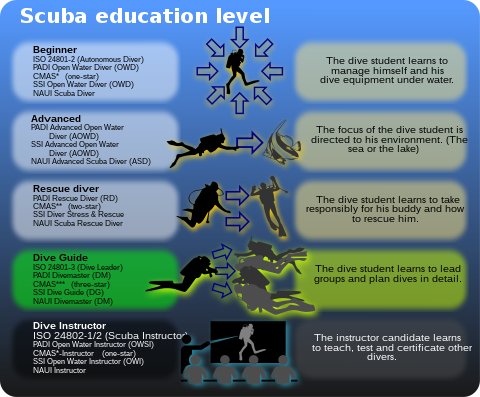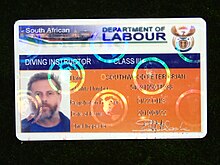A divemaster (DM) is a role that includes organising and leading recreational dives, particularly in a professional capacity, and is a qualification used in many parts of the world in recreational scuba diving for a diver who has supervisory responsibility for a group of divers and as a dive guide. As well as being a generic term, 'Divemaster' is the title of the first professional rating of many training agencies, such as PADI, SSI, SDI, NASE, except NAUI, which rates a NAUI Divemaster under a NAUI Instructor but above a NAUI Assistant Instructor. The divemaster certification is generally equivalent to the requirements of ISO 24801-3 Dive Leader.

Recreational diver training is the process of developing knowledge and understanding of the basic principles, and the skills and procedures for the use of scuba equipment so that the diver is able to dive for recreational purposes with acceptable risk using the type of equipment and in similar conditions to those experienced during training.

Recreational diving or sport diving is diving for the purpose of leisure and enjoyment, usually when using scuba equipment. The term "recreational diving" may also be used in contradistinction to "technical diving", a more demanding aspect of recreational diving which requires more training and experience to develop the competence to reliably manage more complex equipment in the more hazardous conditions associated with the disciplines. Breath-hold diving for recreation also fits into the broader scope of the term, but this article covers the commonly used meaning of scuba diving for recreational purposes, where the diver is not constrained from making a direct near-vertical ascent to the surface at any point during the dive, and risk is considered low.

The British Sub-Aqua Club or BSAC has been recognised since 1954 by UK Sport as the national governing body of recreational diving in the United Kingdom.
Scuba Schools International (SSI) is a for-profit organization that teaches the skills involved in scuba diving and freediving, and supports dive businesses and resorts. SSI has over 2,500 authorized dealers, 35 regional centers, and offices all over the world.

A dive center is the base location where recreational divers usually learn scuba diving or make guided dive trips at new locations. Many dive centers operate under the guidelines of ISO 24803, in which case the facilities must meet the ISO minimum standard for a service provider for recreational diving.

Advanced Open Water Diver (AOWD) is a recreational scuba diving certification level provided by several diver training agencies. Agencies offering this level of training under this title include Professional Association of Diving Instructors (PADI), and Scuba Schools International (SSI). Other agencies offer similar training under different titles. Advanced Open Water Diver is one step up from entry level certification as a beginner autonomous scuba diver. A major difference between Autonomous diver equivalent Open Water Diver (OWD) certification and AOWD is that the depth limit is increased from 18 to 30 metres.

The Israeli Diving Federation (TIDF) is a non-governmental SCUBA diving training organization based in Israel.

Scuba Diving International (SDI) is a Scuba training and certification agency. It is the recreational arm of Technical Diving International, a technical diver training organization.

Open Water Diver (OWD) is an entry-level autonomous diver certification for recreational scuba diving. Although different agencies use different names, similar entry-level courses are offered by all recreational diving agencies and consist of a combination of knowledge development (theory), confined water dives and open water dives (experience) suitable to allow the diver to dive on open circuit scuba, in open water to a limited depth and in conditions similar to those in which the diver has been trained or later gained appropriate experience, to an acceptable level of safety.
The Nederlandse Onderwatersport Bond, (NOB) is the national governing body for recreational diving and underwater sports in the Netherlands. It was founded in 1962. In 2008 there were 290 scuba diving clubs and schools with a total of 20.000 members. The NOB is a member of CMAS Confédération Mondiale des Activités Subaquatiques. The aim of the NOB is to develop recreational scuba diving in the Netherlands.

Diver training is the set of processes through which a person learns the necessary and desirable skills to safely dive underwater within the scope of the diver training standard relevant to the specific training programme. Most diver training follows procedures and schedules laid down in the associated training standard, in a formal training programme, and includes relevant foundational knowledge of the underlying theory, including some basic physics, physiology and environmental information, practical skills training in the selection and safe use of the associated equipment in the specified underwater environment, and assessment of the required skills and knowledge deemed necessary by the certification agency to allow the newly certified diver to dive within the specified range of conditions at an acceptable level of risk. Recognition of prior learning is allowed in some training standards.

A diving instructor is a person who trains and usually also assesses competence of underwater divers. This includes freedivers, recreational divers including the subcategory technical divers, and professional divers which includes military, commercial, public safety and scientific divers.

Dive RAID International is a dive training organization which was founded in 2007 to support diver training for the Poseidon Mk VI Discovery Rebreather. It has since extended its scope to include open circuit scuba training and training for both recreational and technical diving sectors as well as snorkeling and freediving.

Autonomous diver is an international minimum standard for entry level recreational scuba diver certification. It describes the minimum requirements for basic training and certification for recreational scuba divers in international standard ISO 24801-2 and the equivalent European Standard EN 14153-2. Various organizations offer training that meets the requirements of the Autonomous Diver standard. A certification which corresponds to Autonomous Diver allows for independent diving with a dive buddy in open water. Most training organizations do not recommend exceeding a depth of 18 or 20 meters at this level of certification. After completion of this certification the training can be extended to a dive leader to ISO 24801-3 or an intermediate not defined by international standards.

Supervised diver specifies the training and certification for recreational scuba divers in international standard ISO 24801-1 and the equivalent European Standard EN 14153-1. Various diving organizations offer diving training that meets the requirements of the Supervised Diver. A diving certification which corresponds to the Supervised Diver allows for recreational diving under the direct supervision of a divemaster or recreational diving instructor in open water. Most diving organizations recommend not to exceed a diving depth of 10 to 12 metres. After the successful completion of a training equivalent to the Supervised diver, training can be extended to the Autonomous diver certification level.
Dive leader is the title of an internationally recognised recreational diving certification. The training standard describes the minimum requirements for dive leader training and certification for recreational scuba divers in international standard ISO 24801-3 and the equivalent European Standard EN 14153-3. Various organizations offer training that meets the requirements of the dive leader standard. Some agencies use the title "Dive Leader" for their equivalent certification, but several other titles are also used, "Divemaster" may be the most widespread, but "Dive Supervisor" is also used, and should not be confused with the very different status and responsibilities of a professional diving supervisor. CMAS affiliates certifications which meet the requirements of CMAS 3-star diver should meet the standard by default. The occupation of a dive leader is also known as "dive guide", and is a specialist application of a "tour guide".

Introductory diving, also known as introductory scuba experience, trial diving and resort diving are dives where people without diver training or certification can experience scuba diving under the guidance of a recreational diving instructor. Introductory diving is an opportunity for interested people to find out by practical experience at a relatively low cost if they would be interested in greater involvement in scuba diving. For scuba instructors and diving schools is it an opportunity to acquire new customers. An introductory diving experience is much less time-consuming and costly than the completion of autonomous diver training, but has little lasting value, as it is an experience program only, for which no certification is issued. Introductory scuba diving experiences are intended to introduce people to recreational diving, and increase the potential client base of dive shops to include people who do not have the time or inclination to complete an entry level certification program.
A diver training standard is a document issued by a certification, registration regulation or quality assurance agency, that describes the prerequisites for participation, the aim of the training programme, the specific minimum competences that a candidate must display to be assessed as competent, and the minimum required experience that must be recorded before the candidate can be registered or certified at a specific grade by the agency. A standard is a description of the quality required of a product, or a way of doing something that has usually been derived from the experience of experts in a specific field. The purpose is to provide a reliable method for people to share a reasonably consistent expectation regarding the scope and quality of the product or service. Training standards allow objective comparison between the training provided by various agencies and the competence indicated by certification or registration to the specific standard, though in most cases, training and competence may exceed the minimum requirement much of the time, and variation between newly certified divers can be considerable, partly due to differences in the training, and partly due to qualities of the candidate. Training standards may narrowly prescribe the training, or may concentrate on assessment of exit level competence, and allow recognition of prior learning based on various forms of evidence. To be useful, a training standard must be sufficiently specific to allow agreement on the requirements by most readers reasonably competent in the field, including the instructors, assessors, and learners who must use it, the employers of persons trained, the potential customers, and any quality assurance personnel who may need to enforce it. A training standard may be linked to a code of practice referring to how the training should be carried out.
Recreational scuba certification levels are the levels of skill represented by recreational scuba certification. Each certification level is associated with a specific training standard published by the certification agency, and a training programme associated with the standard., though in some cases recognition of prior learning can apply. These levels of skill can be categorised in several ways:











